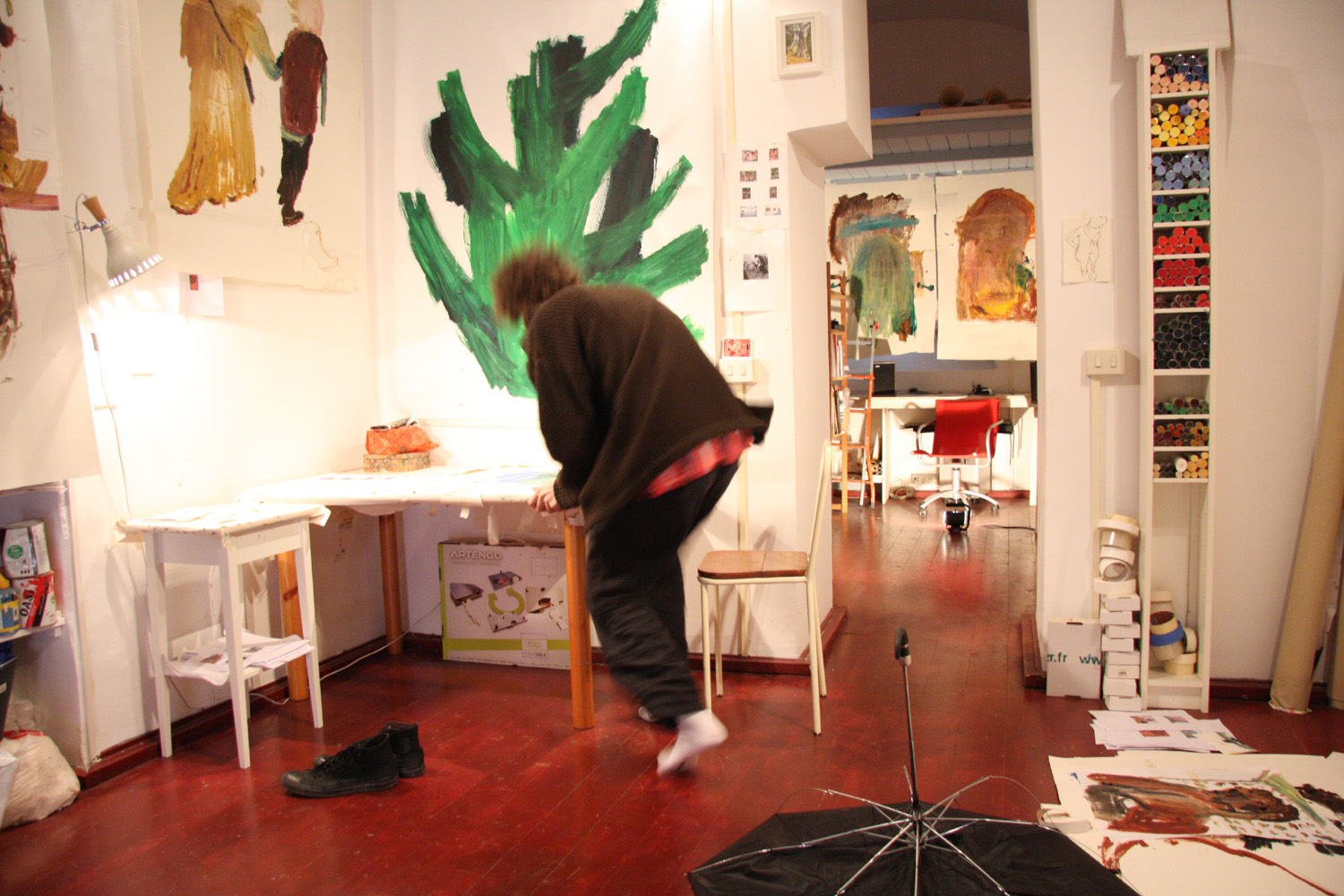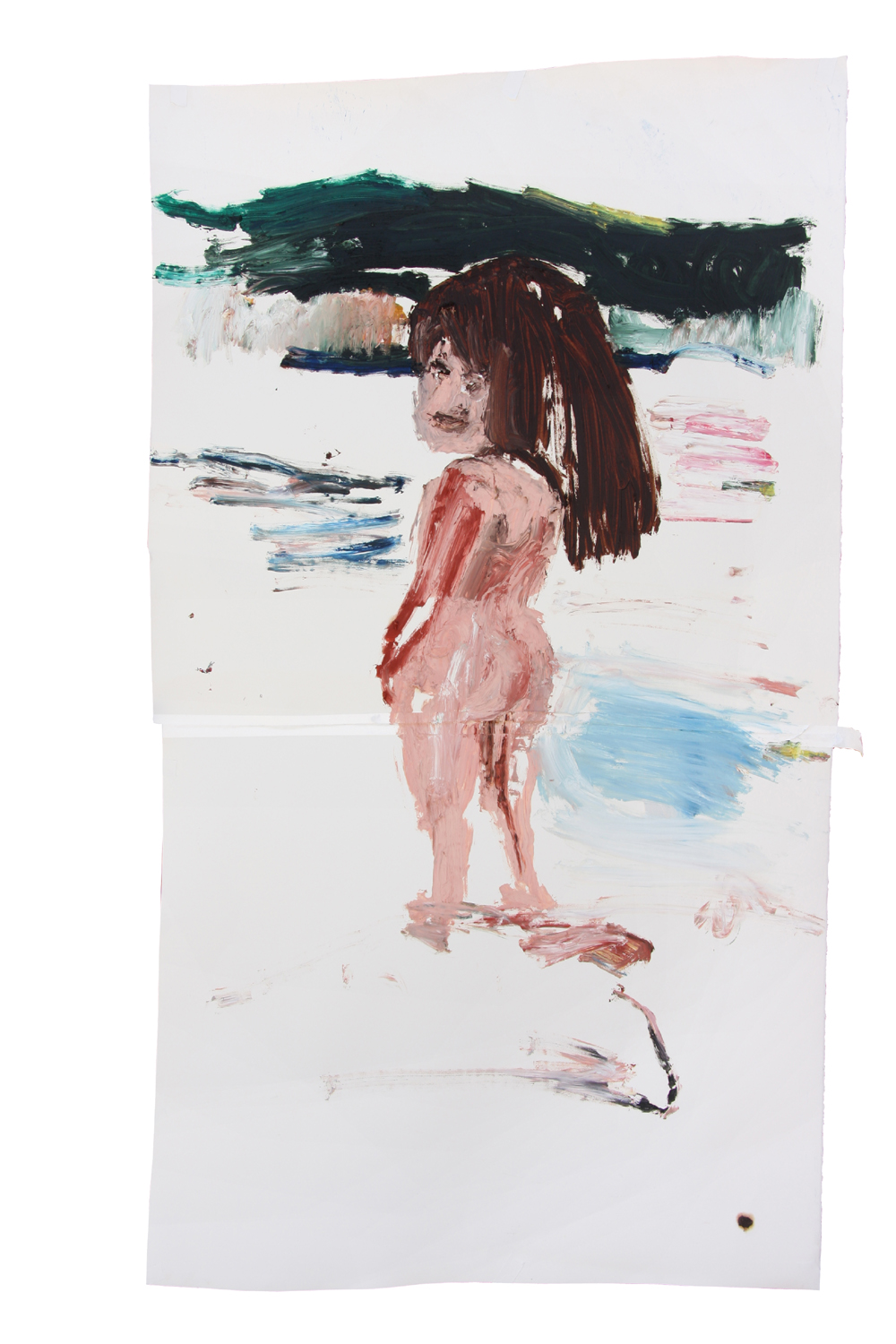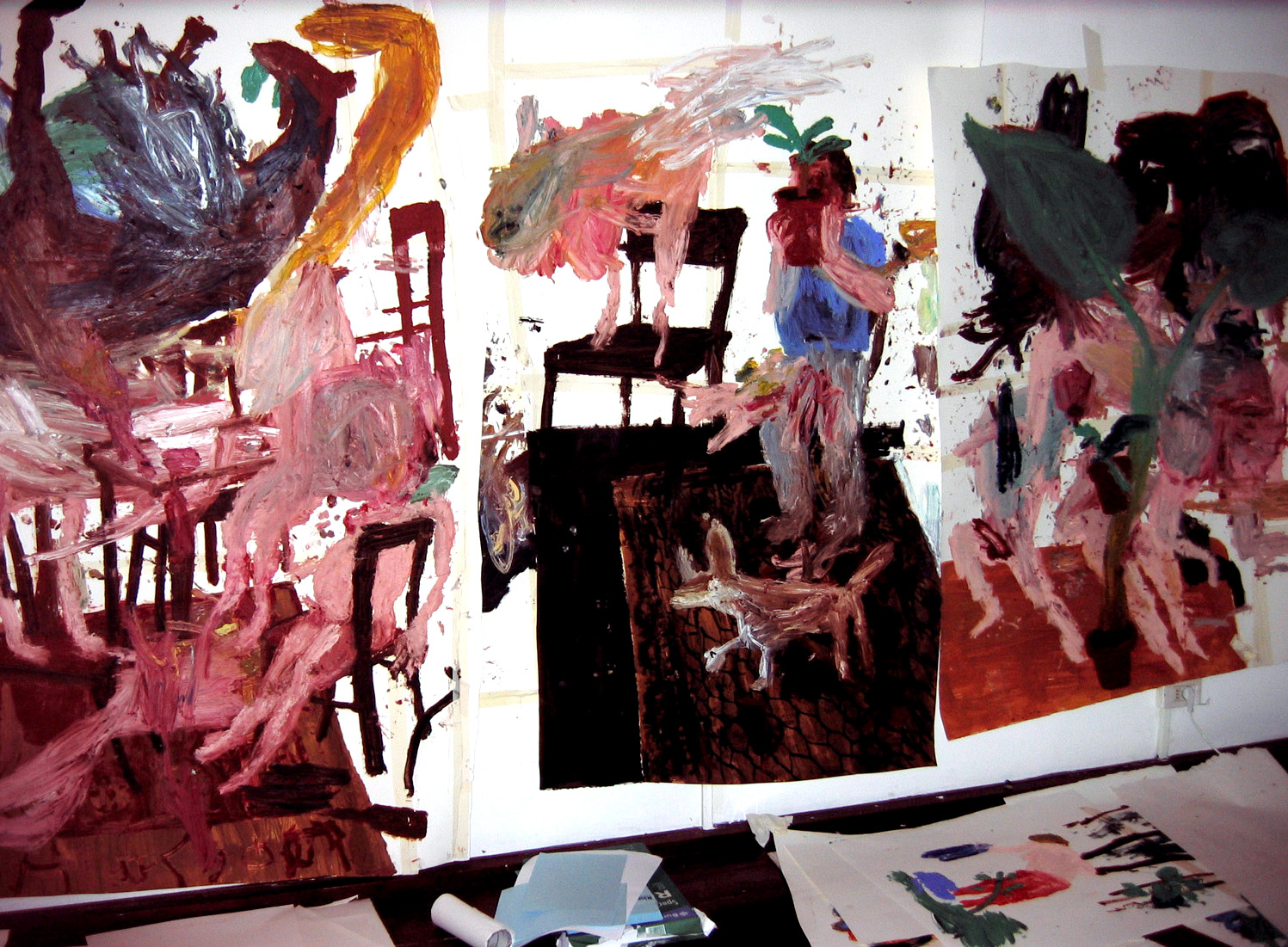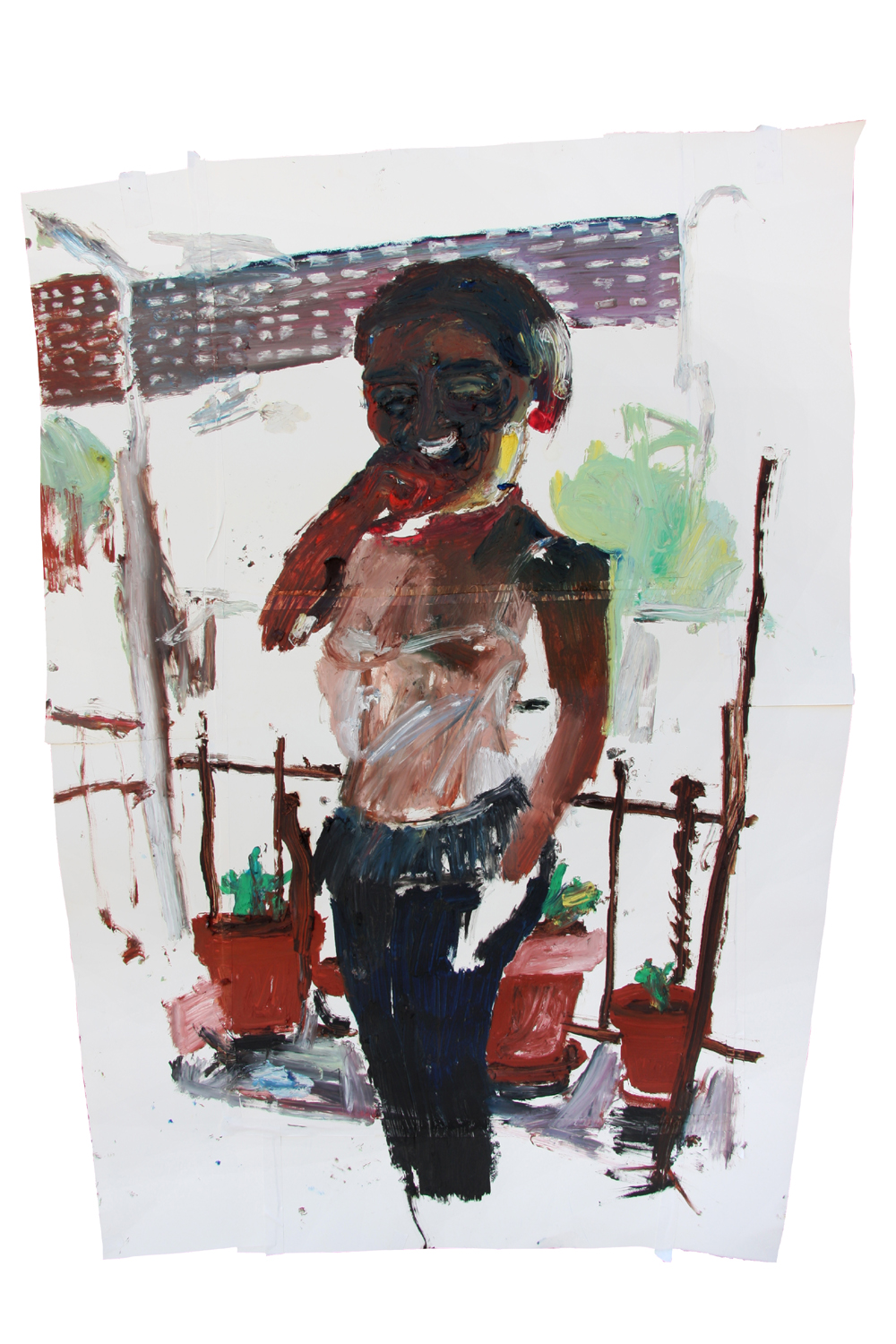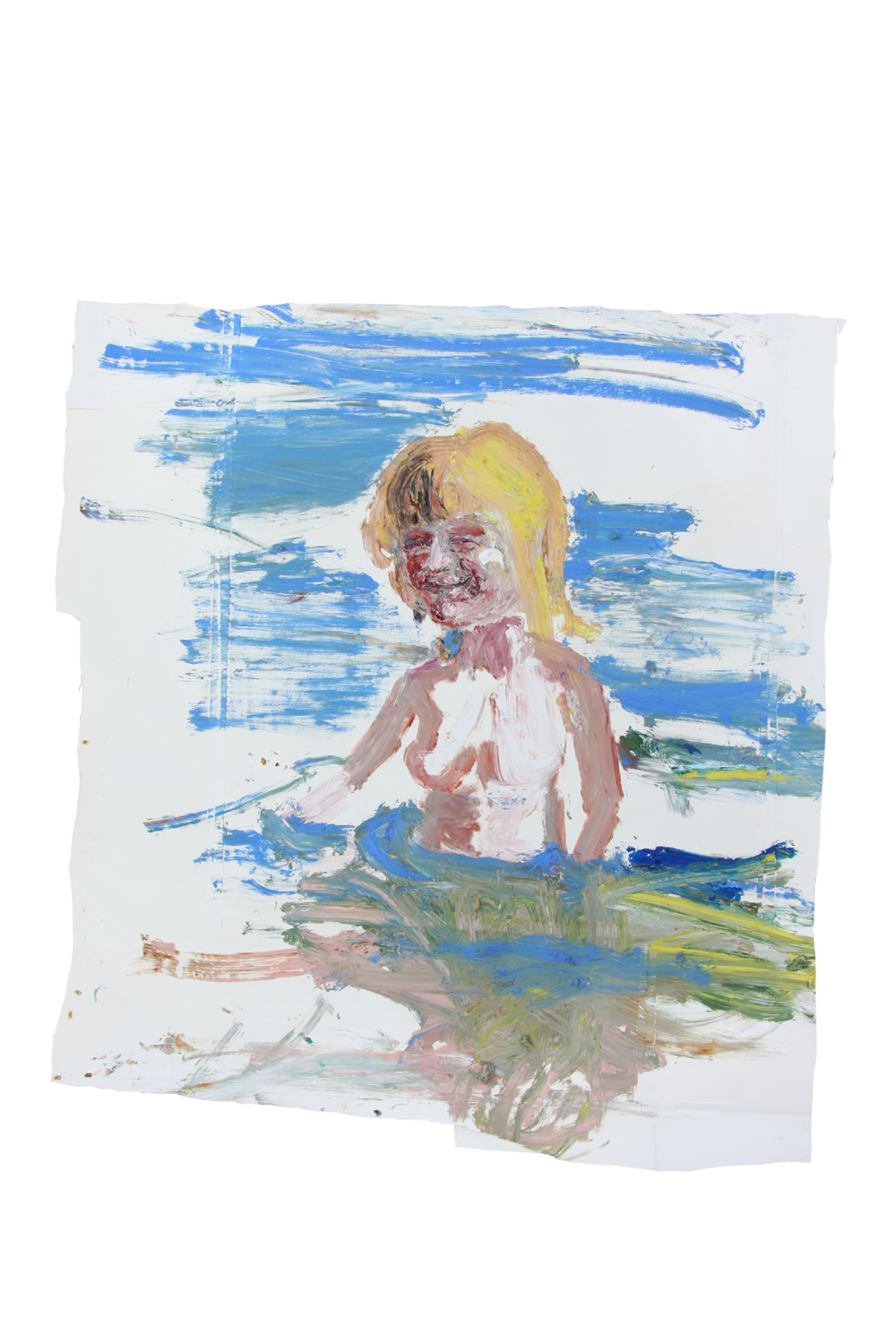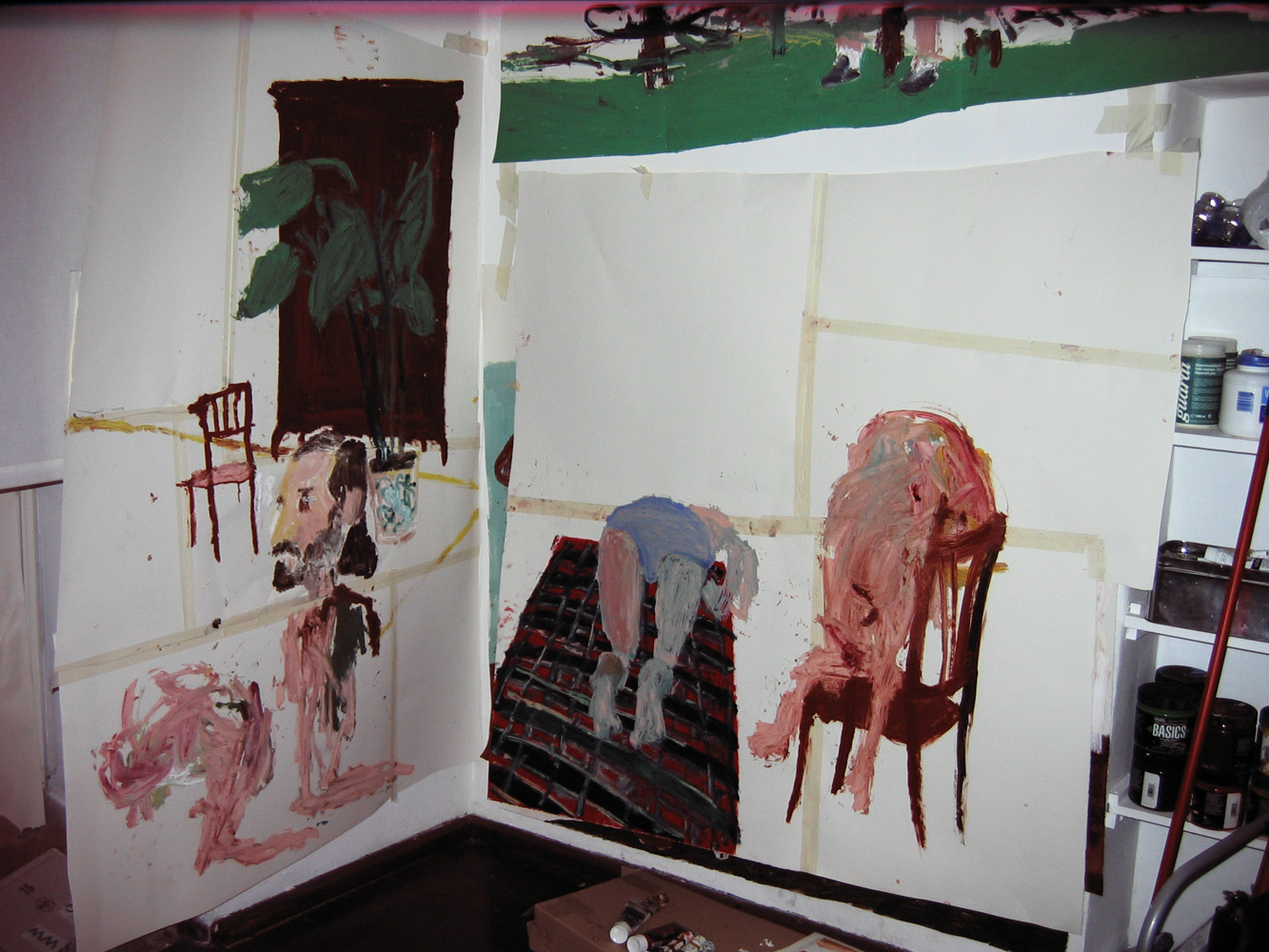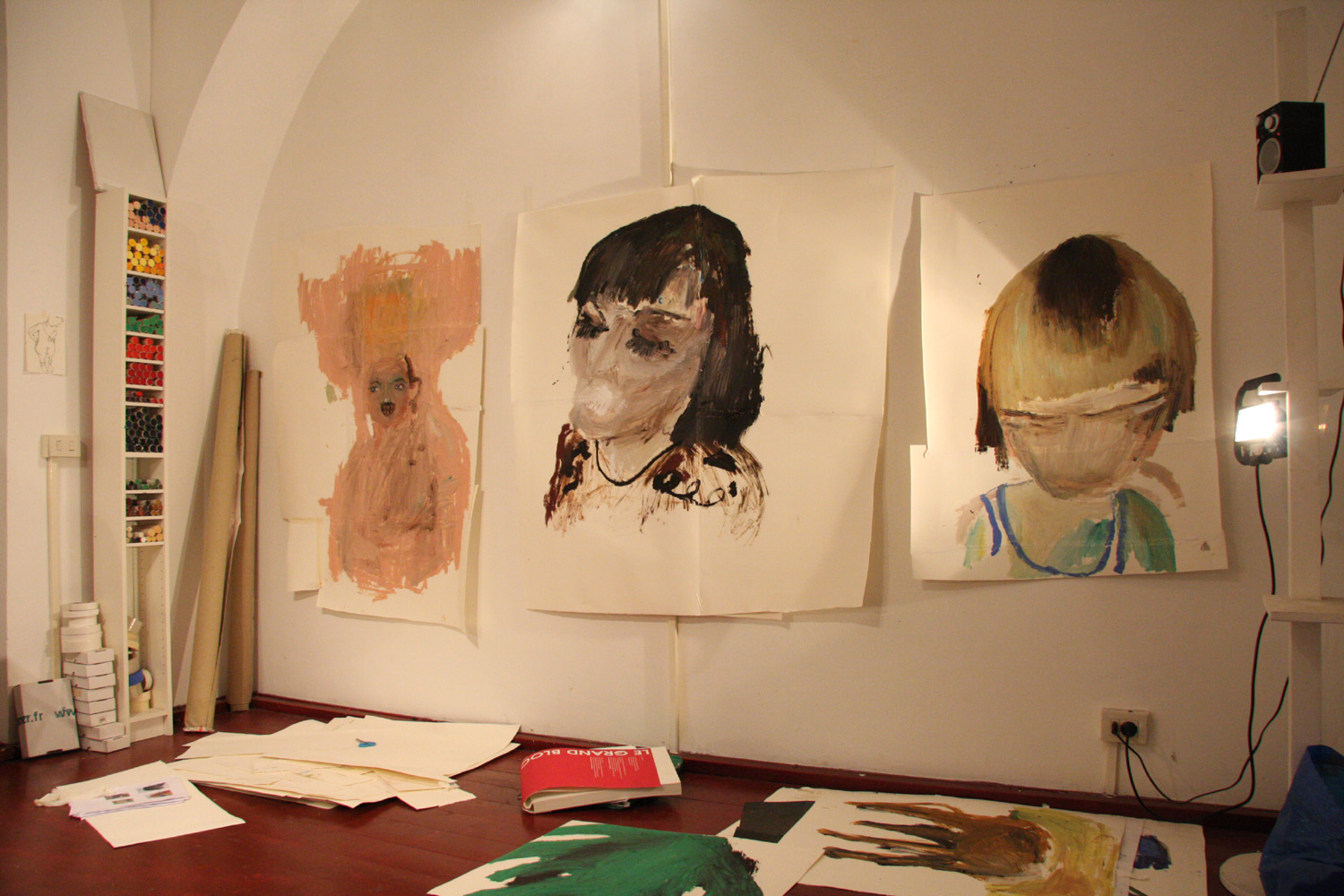Pesce Khete is an Italian painter based primarily in Rome, Italy. He has studied at the Classical Studies Department at the Liceo Ginnasio Torquato Tasso, later on at the Istituto Europeo di Design, and finally at the Accademia delle Arti in Rome. His studio is located in the San Lorenzo district, the area to be in the evening. Pesce’s studio smells like freshly used oil sticks, and the speakers are prominently placed in his space, where he enjoys whistling and singing along to his favorite tunes. For the past three years, Pesce has occupied a two-room studio space right across from a historic pasta factory built in 1905. It was later abandoned in the 60s, until it became the home of the Nuova Suola Romana a decade later by artists Nunzio, Pizzi Cannella, Gallo, Ceccobelli, Dessi, and Tirelli. A new generation of artists has moved in since then and Fondazione del Pastificio Cerere remains a vibrant artistic hub to this day.
Funny enough, I came across Pesce’s work at the Art Athina fair in May 2010 in Athens. This year in particular, the fair was highly conservative. Unfortunately it had an “art bazaar” feel to it that made me very uncomfortable at times. Nonetheless, two booths down from the gallery I was showing with, Pesce’s work caught my eye at The Flat–Massimo Carasi gallery booth. I spent three days at the fair walking around looking for something I’d feel excited about. I totally surprised myself that figurative painting excited me the most and I went back to Pesce’s work again and again and again. His work is raw but highly controlled, very seductive, visually rich, innocently destructive, and kind of sexy. Bodies are captured in private moments whether they are clothed or not and bodily fluids are exposed. At times, his palette becomes dirty and his drawings messy but it is successful because this scatological delight works.
I’ll say no more but keep an eye on Pesce. I have a feeling we’ll be seeing more of him and his work.
Georgia Kotretsos: Tell me a little bit about contemporary painting. What are your thoughts on the discipline and where do you place yourself in relation to your peers?
Pesce Khete: Well, I think that you are aware that your question has vast implications. To even touch on the theme of painting and its role in world of contemporary art could lead to an infinite number of discussions! In fact, as a result of an invitation to participate in the museum exhibition titled Impresa Pittura, organized here in Rome with the scope of capturing the essence of painting as it has evolved in Italy during the last 20 years, I have recently had many opportunities to discuss this subject. The debate is open, even if in reality it has never been closed, and the question is more or less the same: does the art of painting still hold any significance? The reply to this question, one that has been asked repeatedly for more than a century, goes without saying: yes.
Generally, when confronting questions like this, I tend to be very dry and strangely brusque: my approach to painting was a natural progression and this, for me, is an undeniable fact. However, I hold no sense of religious veneration for painting. I am more than anything, an animist or a sustainer of politea [1]: I am attracted to the creations of others, like insects that repeatedly bang into the bulb of a lamp in the brave attempt to enter into its light on the other side of the glass. I don’t want to fall into excessive explanations when I don’t need them. I believe in keeping certain vagueness[es], and I do not consider it particularly important to know myself more than I do, or to expand my preferences. I find it difficult to consider myself as a painter, an artist. I prefer to be an artist, notwithstanding my volition. It would be fantastic to hear someone say: I am an artist, unfortunately. In my opinion (or perhaps, in a more prosaic sense, I feel) that becoming an artist is a trap which precedes one’s own downfall, but of course, this does not signify chance, or vagueness; in fact it is quite the contrary. The “unfortunately” would be a good means through which to detach oneself of it, preserving instead one’s creative capacity.
More than anything else, my attitude leads me to rationalize my work as a “loner” and not as part of “a particular thought.” Pesce Khete, for example, does not mean anything. It is a fictional name that does not belong to the language of any single nation; it is not Italian, nor is it Bulgarian, and above all, it is not American – and in the same sense that I do not see myself as an Italian “artist” (unfortunately), or a Swiss (my second nationality) artist for that matter. In a similar vein, I feel that the drawings, sounds, photographs and the spatial compositions that I create somehow resemble each other. This way I, too, can bang relentlessly against the notes of Richard Utley (the guitarist of Portishead), the forms of Edvard Munch, or the photos of Wolfgang Tillmans. From this point of view, I am like an omnivore, but an omnivore with very complicated tastes.
From this point of view I am like an omnivore, but an omnivore with very complicated tastes. I do not have any particular preferences regarding genre. For example: recently I have been captivated by young abstract artists, and in general by any work of art that is magically and powerfully present.
GK: I see you’ve shown a lot at art fairs. Has that kind of exposure affected your practice in any way?
PK: To exhibit at an art fair is like playing the ukulele at a massive heavy metal music festival, but as a special guest. Honestly, I have never been enthralled by the kind of exhibition represented by contemporary art fairs, but through frequent participation, I have in part learnt to understand them, if not appreciate them. The sensation fairs leave me with is that of being a part of something whose form is beyond control, a torrential overflow that breaches all banks. Excess that becomes too little, the excess that tires one or unexpectedly glides over reality, except when one stops to ask whether this is indeed reality?
They are certainly unique occasions for comparison, and one has the chance to take advantage of a large visual “window” for one’s work – in fact, often my international exhibitions are born of the opportunities for increased visibility. Art fairs have no impact whatsoever on my artistic practice, as I believe it is essential to conserve a certain degree of creative integrity. The opportunity to compare is, in a way, important and indeed necessary, but the process of self-criticism, which begins in the moment that a work is put on show, must be carefully contained. Thus, we can conclude that art fairs are also useful in creating inherent confusion. All said, fairs are great fun when one succeeds in selling works.
GK: You are based in both Rome and Zurich. How do you fit in these two art scenes? Do you make art in both cities? Do you keep two studios too?
PK: In reality, I should speak more generally of Switzerland as a whole. Being my second nationality from my mother’s side and having numerous family relations throughout the country, I cannot limit my discussion to Zurich alone. Switzerland is like a second home where I spend much time during different periods of the year. I do not have a real studio there as for the most part, I only really need a studio during the final phase of my work when I “give vent” to creative expression at the point when I feel that I have accumulated enough. (This said, I buy my paints in Switzerland!)
I do not have a precise take on the two different art scenes because, as I have already mentioned, I tend to isolate myself quite a lot and do not intentionally look for direct contact with other artists. But when, by chance, these meetings do happen they can be wonderful experiences. However, as I was saying earlier, by nature I am not a person who purposefully investigates and broadens my knowledge in a rational way; instead I prefer to perceive things, as this approach is more coherent with my way of working. I suppose I could say that the process of accumulation that unfolds through that irrational state beyond directed thought is more telling of my style and in this sense, the Internet helps me enormously. The Internet allows me both to float and to weigh myself down with immersion weights in order to sink below the surface. More than anything else, it bears witness to my perception of myself as being free of any cultural bonds (this is interesting as I have often encountered this notion while speaking to other people with dual nationality). In this way, my interests and personal tastes go beyond any frontiers, just as my name itself, Pesce Khete, does not belong to any language. But having to improvise a personal overview of these cultural states, I would say that Italy has yet to free itself from a certain cultural “heaviness” (is this a gift or a defect? Often it is a defect), while Switzerland is inherently characterized by a pronouncedly open approach to contemporary culture (saying this at times leaves me with a sensation of superficiality). And certainly, only in Switzerland have I seen beautiful exhibitions of contemporary art in tiny isolated towns of the Alps!
GK: What did you do last summer?
PK: This past summer was very particular. I spent nearly all of July and August in Rome, playing at home. In September, I had the pleasure of going on the Italian tour with a fantastic, super talented musician from New York called Vandana Jain. We rented a house deep in the Sicilian countryside for all of us, where we could play uninterrupted for a whole ten days before the gigs. It was a great experience that allowed me to strengthen my relationship with music. In fact, my relationship with sounds is not dissimilar to my rapport with paints and paper: it is a process that is controlled, to some degree, by experience, but in its realization it is actually untamed. A few years ago, over a relatively short period, I “composed” twenty songs. I played them myself at home and filmed this process using a non-professional video camera. Each instrument, sound, or noise was captured one at a time. Then, using a computer I eliminated the video data and finally the remaining sound tracks were edited using a multi-track audio program. Here, the result is also one of a felt superimposition. Even today, I feel the work is not complete, or “produced” and will never have a conclusion; I see it as one of the most important things I have ever done. Its sincerity almost frightens me — in it almost everything has a visceral interpretation.
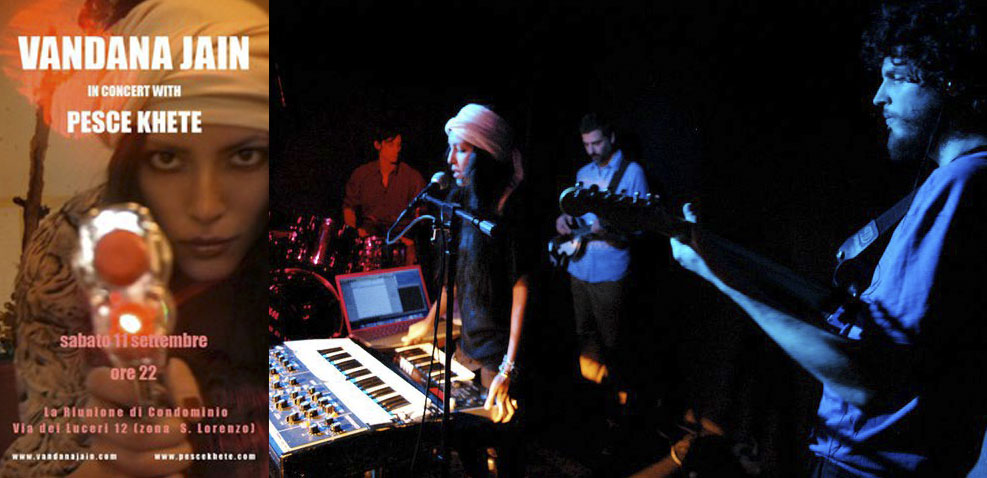
Vandana Jain in concert with Pesce Khete at La Riunione Di Condominio, September 2010. Right photo credit: Nelson Cavallari.
Naturally, playing in a group is a totally different experience, especially because it is an opportunity to compare yourself with and confront the other band members and then the audience. My affinity to painting cannot have been a chance, being an almost entirely solitary practice in which interpretation is mediated. A drawing is exhibited without the need for me to be there with it. Practice and interpretation are two separate moments, also in infinity, and from this point of view, a soundtrack played and recorded alone is more similar to a drawing. However, this time it was wonderful to find a perfect harmony with the other band members, and therefore my approach could remain the same.
Also, one last thing: to play in front of an audience of 5000 people in the open air at night, with a light breeze, is incredible! Who would ever have thought it so?
And that’s a wrap!
[1] According to Liddell and Scott’s Greek-English Lexicon a meaning of politeia is “the conditions and rights of the citizen, or citizenship,” analogous to the Latin civitas (https://en.wikipedia.org/wiki/Politeia)

